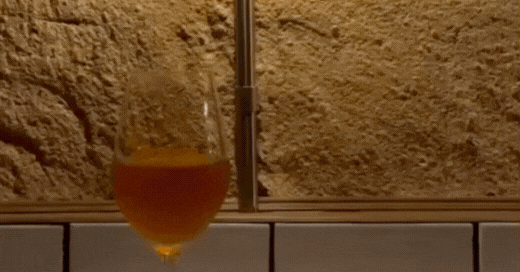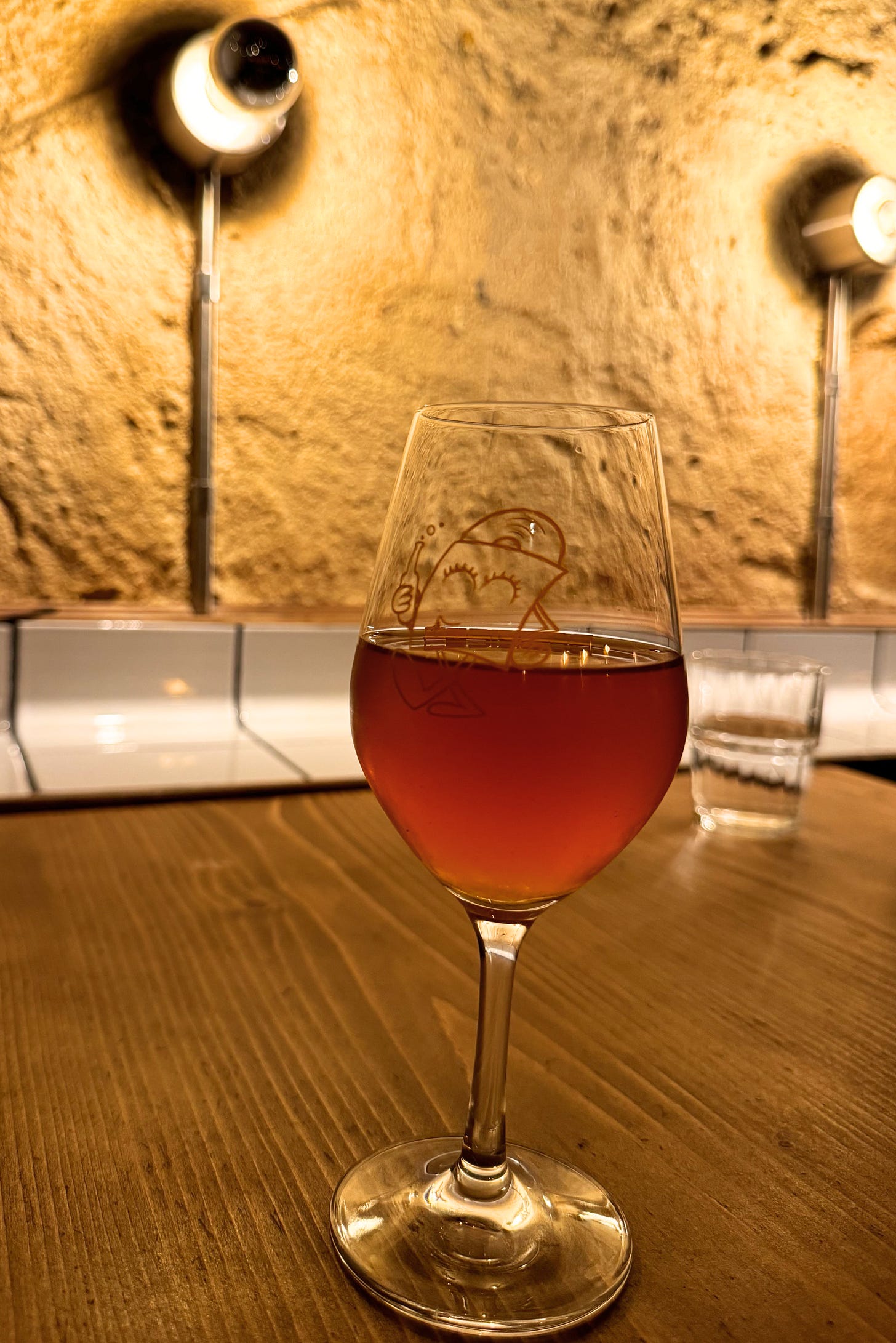I remember one of the first wine tastings that I went to. I happened to be placed at a table of people who really knew what they were talking about when it came to wine. I watched as they expertly swirled their glasses. When I swirled mine the wine almost flew out all over the table.
Then we all sniffed and were asked to say what smells came to mind. Dark red currants, blackberry, plum, leather, tobacco and all sorts of other things were mentioned. I kept my mouth shut because the only thing I could think of was, ‘This smells like wine to me.’
Years later, I’ve come to appreciate wine in a completely different way. Not because my palate has been refined or because I’ve taken wine courses on how to pick out scents like truffles or crushed gravel, but because I study the Bible.
The Bible has a lot to say about wine and how it relates to our lives together, our relationship to the earth and our relationship to God.
In the ancient world, from the very earliest civilizations, wine was an important part of everyday life and religion. Whether in Egypt, Assyria, Babylonia, Persia, Greece or Rome, wine was a critical fixture in worship and making offerings to the gods. Stories of wine gods like Dionysus or Bacchus reveal a drink that was created to please both the gods and humanity. Tales are told of wild bacchanals or orgiastic feasts that likely ended with bad hangovers and much worse.
In many of these ancient cultures wine was seen as a gift from the gods so that human beings could enjoy themselves and it was offered back to the gods in all types of religious rituals that often involved drunken exploits. In the Bible, however, we find a very different story. It’s a story that goes back to the very beginnings of creation in the garden of Eden.
The first book of the Bible, Genesis, begins with a God who creates the heavens and the earth. This is not some distant god who is separated from his creation. God is depicted as a gardener who is not afraid to get his hands dirty in the soil.
God forms the first human from the dust of the earth and then breathes into him the breath of life. We usually call this person ‘Adam’, as if it’s a personal name, but it’s not. ‘Adam’ is a wordplay on the Hebrew word for soil adamah. The reason for the wordplay is to emphasize humanity’s connection to the soil.
We, as human beings, are inextricably bound to the life of the land. Our nourishment, our sustenance and our very existence is reliant on the earth beneath our feet.
Beyond our physical connection to the land, the story of Genesis (and the rest of the Bible) also assumes our spiritual connection to the land. When the first garden dwellers disobey God’s command and eat the forbidden fruit, the land becomes cursed. We witness a breakdown in what was originally meant to be a harmonious relationship between Adam and adamah.
Adam will now experience toil when he works the land and it will produce thorns and thistles. Here, in the garden, the moral world is bound up with a material world.
Human disobedience to God’s command results in a broken relationship with God, with one another and with the land. We’ll discover, as the story continues, that wine is a gift that comes from the renewed earth through Noah to provide relief for humanity.
Most people are familiar with the story of Noah’s Ark, but not many people know the prediction made by his father, Lamech, when Noah was born. Lamech says,
‘Out of the ground that the Lord has cursed this one shall bring us relief from our work and from the toil of our hands’.
We are told that Noah found favour in the eyes of God, that he was righteous and blameless and that he walked with God. It’s through Noah’s moral purity that humanity’s relationship to the land is restored and the gift of the vine springs up to bring relief from our toil.
The Bible offers a picture of a world where the material and the spiritual are bound together within the intricate web of creation. The earthly and the heavenly are united.
Though we are made from the soil and tethered to the land, we are also spiritual creatures who share in the breath of God. We have the capacity to experience spiritual blessings from God, but we also experience his gifts through our senses, through our physical engagements in the world and through the gift of wine.
To taste a well-crafted wine is to drink in the sun, the rain, the wind, the soil and all the blessings of the earth.
When we are attentive to the wine we’re able to savour its complex flavours and aromas. We come to appreciate its multifaceted character and the reflections it offers on the land where it was grown and harvested. Wine, unlike any other food or drink, brings out the qualities and identity of a particular place.
There is a French word, terroir, that is often used to describe this connection to place that gives a wine its character and flavour. Wine experts understand that even the slightest change in weather, soil content, drainage or the lay of the land can have dramatic effects on the final product.
I don’t doubt that the biblical authors understood the same. They also understood that the gift of wine and the relief that came through Noah, was also connected to our moral lives, to how we love God and neighbour and to how we care for his creation.
The story of wine in the Bible is one that reminds us that we don’t live in this world as autonomous creatures completely disconnected from the land around us. In the Bible, human beings were instructed by God to care and keep the land as an act of service and partnership with the hope of encouraging fertility, abundance and life.
American conservationist, Aldo Leopold, sums this up when he writes about having a ‘land ethic’ that should govern how we live in the world. He argues that our ethical behaviour should take into account things like soils, water, plants and animals. He goes on to say that this, ‘changes the role of Homo sapiens from conqueror of the land-community to plain member and citizen of it.’
We live in an age where humanity is driven by the pursuit of power and control over the environment rather than creatively working with, and caring for, the natural world.
Advances in technology and the idea of limitless freedom have led to what Old Testament scholar Walter Brueggemann calls an ‘economy of extraction’. This is a system that strips the land without concern as if our resources are unlimited and are ours to do with as we please. These practices not only destroy the ecology and biodiversity of the land, but they can also deprive local economies and create greater gaps between rich and poor.
The beginnings of wine in the Bible tell a story that involves the whole of creation. It’s a story that emphasises our relationship to the land, to God and to one another. How we care for and keep the soil is a reflection of how we care for one another.
Other stories in the Bible imagine a world full of justice and mercy where there is peace and concern for the common good. In such a world the biblical authors also see the earth respond with its own fertility—fields that produce bumper crops, trees that bear abundant fruit and hills bursting with grapes and wine.
Wine is not just a drink in the Bible. It’s a sign and symbol of salvation, of life, joy, abundance and fertility. Wine is a gift that eases our toil and makes our hearts glad.
Wine reminds us of our deep connections to the soil and how we play our part within the community of creation.
So, as we lift our glasses to celebrate in our homes, at meals, at weddings, or wherever we are, let’s say a prayer of thanks for the gift God gives that eases the toil and gladdens the heart.





This was such a poetic read 😍 I never realised how deeply wine connects so many things, from theology to environmental justice to modern culture. It really made me see it in a new light. Loved how this piece tied everything together so effortlessly!